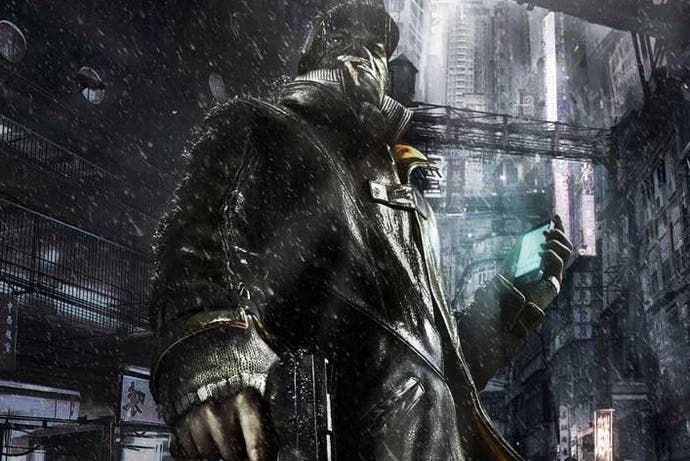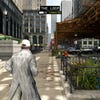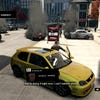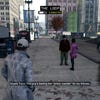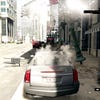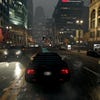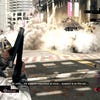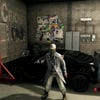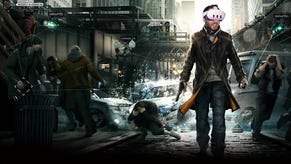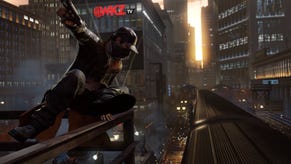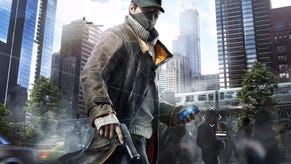Does Watch Dogs deliver on its stunning E3 2012 reveal?
Digital Foundry presents in-depth tech analysis.
Watch Dogs' unveiling at E3 2012 lives fondly in the memory for two reasons. Firstly because it was one of our earliest looks at a real next-generation console title, flaunting a calibre of lighting, physics and effects in a sandbox world that trumped any PlayStation 3 and Xbox 360 reveals that year. Secondly, it was announced for no console in particular at the time, with Sony and Microsoft still stubbornly quiet about their new hardware plans. Having sparked off the next-gen discussion two years ago, though, does the final game deliver the explosive excitement we were promised? We've been playing the finished article on PlayStation 4 to find out.
First up, a few sobering truths. We have confirmation that the 2012 reveal was in fact running on PC hardware, although Watch Dogs' creative director Jonathan Morin states both next-gen consoles are on par with the PC's 'high' settings, one notch down from the top-most 'ultra'. Access to the Xbox One release, and indeed code for last-gen consoles, was unavailable at the time of writing, meaning our full Face-Off feature is to follow in the coming days. But having spent plenty of time testing the game on Sony's new console, it's clear which elements of Ubisoft Montreal's Disrupt engine hold up from the earliest demonstration.
To start things off, we have a 14-minute performance analysis below showing the game's opening missions. Emerging from the baseball stadium, we get our first taste of the game's approach to lighting as Chicago's power grid switches back on, filling the city's dampened streets with streaks of reflected colour. A big selling point of the Disrupt technology is its presentation of these rainy night-time scenes, which are built from up to hundreds of light sources and a convincing water shader effect. It looks superb in its PS4 incarnation.
However, it quickly becomes apparent why this specific time of day and weather were chosen for the original demonstration: it's the most visually impressive combination the game has to offer. Lighting during the day is less awe-inspiring, with over-saturated sunlight causing the world to appear too harshly lit. Shadows fail to hold up at this level of visibility, too, thanks to the blurred, dithered approach used to dynamically cast shadows from buildings. We do get treated to neat visual tricks with low-cast sunlight, though, such as the ever-popular light shafts and blades of light streaking between tree branches, plus lens flare and bloom. But tonally the game looks its best when played at night, where the neo-noir mood is evoked loudest.
"An early playthrough shows impeccably lit night-time scenes, while daylight emphasises the blemishes in Watch Dogs' technical presentation."
Daytime play reveals s other blemishes. While the engine streams the sandbox world effectively while on foot, driving at high speeds brings out some obvious pop-in. Car headlights often appear before the chassis of a vehicle materialises, while objects on the pavement fizzle into view. Level-of-detail settings leave much to be desired, and the pop-in becomes a distraction during rapid pursuit missions.
In terms of image presentation, we're par for the course with other key releases this generation. We can confirm a 1600x900 internal resolution on PS4 from our pixel counts, as promised in advance by the Ubisoft blog. The post-process anti-aliasing - presumably similar to the temporal SMAA that was added to Assassin's Creed 4 in a patch - does a strong job of tackling the upscaled edges without blurring over the image, too, although it inevitably lacks the clear 1080p finish of games like inFamous: Second Son.
Watch Dogs PS4's world is beautifully constructed in the geometric sense, with NPCs and cars moving of their own accord - and even a metro system running in a loop on the upper stratum. Unfortunately the textures mapped across the city vary wildly in quality, going from sharp, bump-mapped suburban gardens to grainy, low-res texturing on less-travelled roads. It's a look that isn't far removed from current-gen efforts at times, but the killer blow is the use of low-grade texture filtering, causing surfaces a few paces ahead to appear blurred. Alongside the asset-streaming issues, this is an area we had hoped the PS4 version would handle more adeptly.
Watch Dogs' high points deliver on our expectations of a next-gen game. Physics are standout across the board, with customised physics in the Disrupt engine to thank for the swaying cloth physics on Aiden Pearce's cloak, wind simulation, and also some of the best water physics we've so far seen in a sandbox game [Correction: we previously credited the Havok middleware for this - it's used for low-level physics, but higher-level effects are the work of Ubisoft's tech team]. It ranks as a major component of the promised experience, as the chaos that ensues from hacking traffic lights is brought to life all the more vividly with car destruction and ragdoll physics at play. It creates the impression of a sandbox where anything is possible, as it should.
"In the final analysis, the delay seems worthwhile - the final release is tighter and more polished than anything we've seen from the game previously."
Camera effects such as per-object motion blur make an appearance, too, which alongside depth-of-field brings out a cinematic twist when rapidly raising a gun's scope. Unfortunately smoke, fire and water alpha quality don't hold up to the high standard in effects set by the likes of the inFamous: Second Son - but few can. It's a convincing effort though, where in current-gen games we'd typically expect a curtailing in alpha resolution to uphold performance.
As for scripted scenes, Watch Dogs relies on a mixture of in-engine cut-scenes and pre-rendered videos to drive the story forward, with one often being difficult to distinguish from the other. Character modelling and motion capture remain on-point with what we had expected from earlier E3 demos - no real change, but we had anticipated more from the beginning. Much like the Assassin's Creed series' cut-scenes, the hand-keyed facial animations are already starting to date when compared to the efforts of Naughty Dog, Sucker Punch or Quantic Dream.
Looking at performance in our extended 14-minute video, we see a near-monotone 30fps line through thick and thin, albeit equipped with an adaptive v-sync where screen-tear kicks in when performance dips under target. Admittedly the opening areas funnel the player through undemanding tutorial-focused areas, but our first chance at an outdoors car chase immediately reveals a flicker of screen-tear creeping in. It's difficult to notice as we're tailed by cop cars, and the frame-rate still holds diligently to 30fps either way - but the engine vulnerability is clearly there.
"PS4 performance is generally stable at 30fps, though tearing does creep in occasionally when the engine is under heavy load."
To force Watch Dogs' hand in this sense, we push it with more exciting range of stress-tests. This ranges from boat-rides around the docks to ballistic rampages through the city centre. Putting the grenade launcher to use causes tearing, as does driving through water hydrants to create a burst of alpha. But to really buckle the frame-rate - the lowest point on record being a constant 24fps - we need to drive through streets littered with car wreckages and armed police officers, accelerating through every object on the pavement. The drop from 30fps is sustained but hard-earned, proving it's the physics engine that drags performance down most.
With a generally stable 30fps lock in place then, the Disrupt engine is well-suited for emergent online gameplay. Rather than selecting a separate multiplayer mode as per Grand Theft Auto 5, the online systems in Watch Dogs are woven into the solo game from the off, allowing you to roam the world with up to eight players. Dark Souls-style invasions by other hackers are also possible, with players tasked with stalking you for information, or bloody-mindedly setting out for the kill. All sorts of carnage can break loose in one contested spot, of course, potentially bringing the performance tumbling down. However, the rugged performance of PS4 solo play shows there's enough of an overhead to support this.
Watch Dogs also scores well in that its mostly stable performance level isn't fazed by the quality of the environmental simulation. Running back time-lapse footage and comparing it with Grand Theft Auto 5 reveals many similarities - a full day/night time cycle, and proper atmospheric simulation in place of shifting pre-rendered skyboxes. Just like the GTA games, NPCs have varying context-driven behaviours, although we also note that memory has been spared on making them even more realistic - restaurants have diners and waiters for example.
"Strip out the initial CG inserts and the final PS4 title hands in an overall experience that realises the E3 2012 reveal."
Watch Dogs: the Digital Foundry verdict
Watch Dogs meets most of our expectations of a next-gen title, but falls a little short on others. It's clear that the six-month delay has resulted in a significantly more polished title, but some parts of the visual presentation are still stronger than others. Night-time lighting counts as a huge high point, for example, delivering on the early promises made in its rain-soaked E3 2012 showcase. In concert with the custom physics used for cloth simulation, ragdoll impacts and water, the world not only looks, but reacts in a way we hope future titles will expand upon.
But it's often the case that the game carries the distinct air of the 2013 launch window title it was originally meant to be. Technical aspects such as the weak texture filtering, pop-in and dithered shadows stand out in the face of an impressively constructed Chicago cityscape. Seamless online play adds an exciting dimension to the sandbox formula too, though not necessarily a brand new idea to the console scene itself; players are able to invade one another, complete missions in co-op, or compete in races. That said, the improved hardware makes delivery of this idea more tenable, where getting any frame-rate drop below the 30fps line in solo play requires some heavy stress-testing. The overall impression is that gameplay and frame-rate consistency are strong, on the tested PS4 version at least.
Does Watch Dogs truly deliver on the promise of its initial E3 2012 reveal? The short answer is yes. Cutting away the obviously pre-rendered CG inserts at E3 2012 leaves a slice of gameplay that is indeed a close match for the final game. In fact, the finished game comes out of the comparison very favourably, because that original demo only represented a tiny fraction of the overall offering; Watch Dogs as it ships is an ambitious project with a massive cityscape to explore and a vast array of tasks to carry out. The only downside is that, on a conceptual level, this still feels like a game that takes the template established by the last-gen Grand Theft Auto titles and merely embellishes it - often dramatically - as opposed to completely reinventing the genre in the way that many might have hoped. Whether it's the true next-gen experience you wanted is down your expectations, then, but on a technical level we do not feel duped by the original reveal.
If you've come unstuck on a mission, take a look through our Watch Dogs strategy guide.
